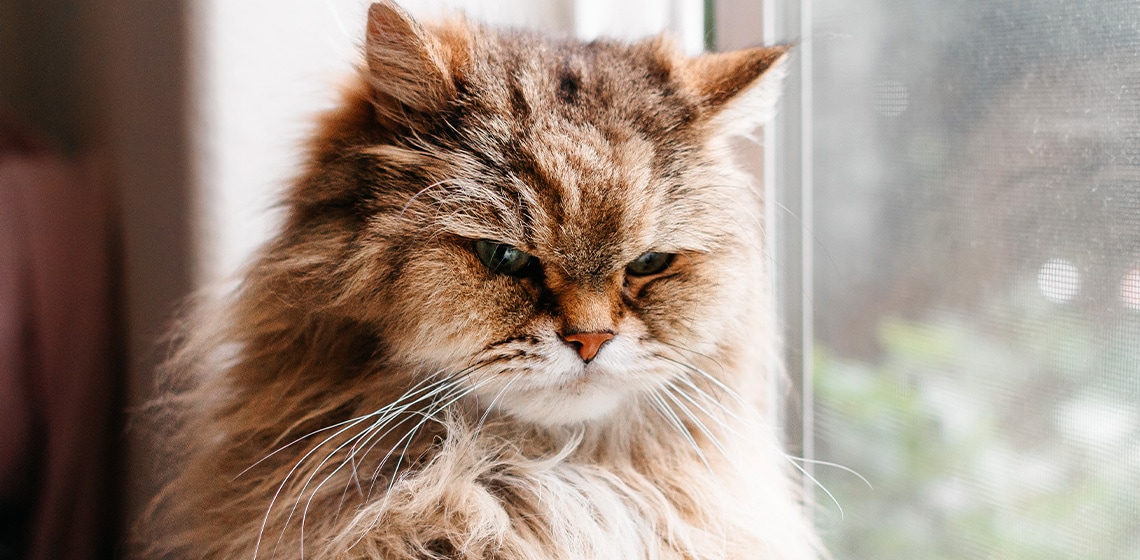Cats are well known for their mood swings and may not always be as pleased to see you as your dog is. But are cats capable of holding a grudge? Or are they actually a little more forgiving than we give them credit for? In this blog, we’ll explore feline behavior in a little more detail.
How long does a cat’s memory last?
Less research has been done regarding cat cognition than dogs so we still don’t know all the answers. What is apparent though is that kittens have a relatively short memory and can appear to be more forgiving than older cats. Cats also have different types of memory, just as people do –
- Working memory
Working memory refers to how much information can be temporarily stored, and ready for immediate use. This allows us to make decisions and work problems out. One study shows us that a cat’s working memory may be limited.
- Short-term memory
This falls somewhere between working and long-term memory. It refers to a brief period where you can recall information that you were just exposed to, anywhere between a few minutes and a few days. Various sources online state that a cat’s short-term memory lasts around 16 hours, though other studies have proposed it to be less than this.
- Long-term memory
Long-term memory describes the ability to remember events and information from the past. This appears to be more of a strength in cats, though there is no conclusive study on how long a cat’s long-term memory lasts. It is thought to be highly variable depending on the cat’s breed, health status, and age.
So, memory is not only what helps us to work out problems, but what helps to stop problems from happening again. We do this by remembering what went wrong last time and avoiding it next time. A cat that remembers something bad happening will be keen to avoid it again, making it seem as though your feline friend has a grudge. There is no definitive answer as to how long your cat will do this. For many cats, minor misdemeanors seem to fall in the short-term memory category so it is likely all will be forgiven within a few hours to days.
Kittens have a relatively short memory and can appear to be more forgiving than older cats.
How do you know if a cat is mad at you?
Usually, it’s fairly obvious if a cat is feeling grumpy, they are often quick to let us know if they aren’t happy! Here is a list of things that your cat might do if he’s feeling cross –
- Your cat hides or leaves the room when you enter it
- They appear tense, stiff, or on high alert
- Their tail is swishing angrily from side to side
- Their ears become flattened against their head
- They arch their back and puff their tail out to make themselves look big
- Hissing or growling at you
- Swiping with their paws
- Lunging or biting
If your cat appears to be acting aggressively then don’t approach them as it could provoke an attack. Give them some space to calm down.
If your cat appears to be acting aggressively then don’t approach them as it could provoke an attack.
So… do cats bear grudges?
Cats don’t bear grudges in the same way that we do. Instead, they form associations with negative events. This helps them to try and prevent the same bad thing from happening again. For example, if they accidentally fell down the stairs at home, they may end up avoiding this area for a while for fear of the same thing happening again. It’s a protective mechanism that would have also kept their wild ancestors safe.
If you accidentally step on your cat your furry friend may have a similar aversion to you for a while too. This can make it feel like he is holding a grudge against you, but what he’s really doing is trying to protect himself. He’s using his memory of recent events to learn from his mistakes and keep himself safe next time. Most cats will come round from this fairly quickly though, especially once they remember that you are usually a nice person to be around, particularly at mealtimes!
Cats don’t bear grudges in the same way that we do. Instead, they form associations with negative events.
How can you help your cat feel less moody?
If your cat seems ‘off’ with you, perhaps because you had to take him in the cat basket to the vets (which he hated) or you accidentally trod on his tail, then you could try the following to cheer him up again –
- Don’t invade his personal space – don’t try and force him to like you by picking him up or fussing him if he doesn’t want it. This will only make him feel more cross.
- Sit quietly in the same room as him – let him approach you. You can encourage this by placing some of his favorite toys or bedding near to you.
- Prepare his dinner – if it’s clear he’s feeling grumpy at you in particular then be the one to feed him. Prepare his favorite meal and then stay in the vicinity, but again give your cat some space
- Try gently calling and talking to your cat – if he’s responsive then try and engage him in some play with a favorite toy or treats
If your cat continues to seem generally out of sorts, then you may need to seek professional help. Get them checked by a vet to make sure there are no underlying health reasons as to why they are feeling a bit grumpy.
Conclusion
More research needs to be done into the specifics of cat cognition, but we do know that most animals will be protecting themselves rather than holding a grudge against you. If there has been an incident that has worried your cat then give him a little space to let him calm down again, and usually, all will be forgiven. If your cat seems unwell at all or just not right, then getting him checked over by a vet may be worthwhile.
FAQ
It can be quite variable how long a cat will stay mad! It depends on how serious the incident was that made him cross in the first place. Minor incidents will usually be forgotten with hours to days, but if you repeatedly do something he doesn’t like then may start to develop an aversion to you as things become cemented in his longer-term memory.
Cats don’t hold grudges as such, usually, they are just trying to protect themselves. They may avoid you for a little while if you accidentally hurt or scared them, just until they work out you are no longer a threat again.
Most cats know where their food and affection come from, so will usually forgive their owner fairly quickly for minor incidents. However, if there are constant breaches in trust and repeat events that make him unhappy, then he may find it harder. This is particularly the case if he isn’t getting any positive interactions with you to balance things out.

Rebecca is a companion animal vet who has always had a passion for writing and client communication. Since her graduation from the Royal Veterinary college in 2009, she has gained a wealth of experience in first opinion small animal practice, in both clinical and managerial roles. She currently works in the South West and deals with a variety of routine and emergency appointments, but particularly enjoys medicine cases. Outside of work and writing, she enjoys spending time with her family, including her bouncy flat-coated retriever George!








